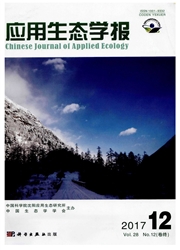

 中文摘要:
中文摘要:
通过盆栽试验,研究了施用猪粪和鸡粪条件下红壤中的砷对小白菜生长和吸收的影响及土壤有效态砷含量的变化.结果表明:向高砷红壤中施用猪粪和鸡粪两种有机肥均使小白菜的生物量有不同程度的增加,其中,施用猪粪处理的小白菜生物量显著高于对照处理(P〈0.05);猪粪和鸡粪两种有机肥的施用可导致土壤有效砷含量明显提高,施用猪粪后土壤有效砷含量增幅达394.9%~1033.6%,而施用鸡粪的土壤有效砷含量增幅为30.4%~94.1%;施用有机肥明显促进了小白菜对砷的吸收,其中猪粪处理下小白菜的砷吸收量比对照增加20.7%~53.9%.根据本研究结果,对砷含量较高的高风险农田,施用猪粪、鸡粪等有机肥可能会在一定程度上提高土壤有效砷含量和作物对砷的吸收量,使农产品质量和环境风险增加.
 英文摘要:
英文摘要:
A pot experiment with arsenic-contaminated red soil was conducted to study the effects of applying pig dung and chicken manure on the growth and arsenic absorption of pakchoi (Brassica chinensis),and on soil available arsenic. Applying pig dung and chicken manure to the arsenic-contaminated red soil increased the biomass of pakchoi to some extent. Comparing with the control,applying pig dung increased the pakchoi biomass significantly (P0.05). The soil available arsenic content after applying pig dung increased by 394.9%-1033.6% (P0.05),and that after applying chicken manure increased by 30.4%-94.1%. Organic fertilization promoted the arsenic absorption of pakchoi,with the arsenic uptake after applying pig dung increased by 20.7%-53.9%. The application of pig dung and chicken manure to arsenic-contaminated red soil could somewhat increase the soil available arsenic content and the arsenic uptake by crops,and thus,increase the risks of agricultural product quality and environment.
 同期刊论文项目
同期刊论文项目
 同项目期刊论文
同项目期刊论文
 Arsenic Content and the Bioavailability in Farmland Soils Affected by Mining Activities of a Realgar
Arsenic Content and the Bioavailability in Farmland Soils Affected by Mining Activities of a Realgar 期刊信息
期刊信息
